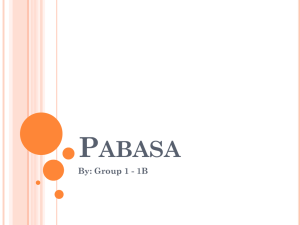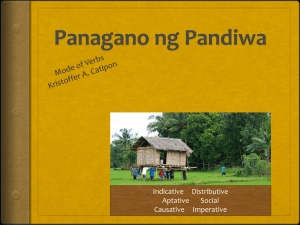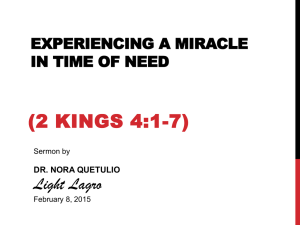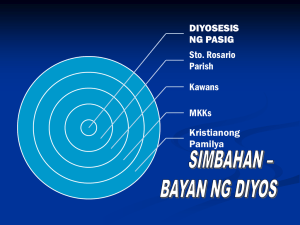I- vs. *in - WordPress.com
advertisement
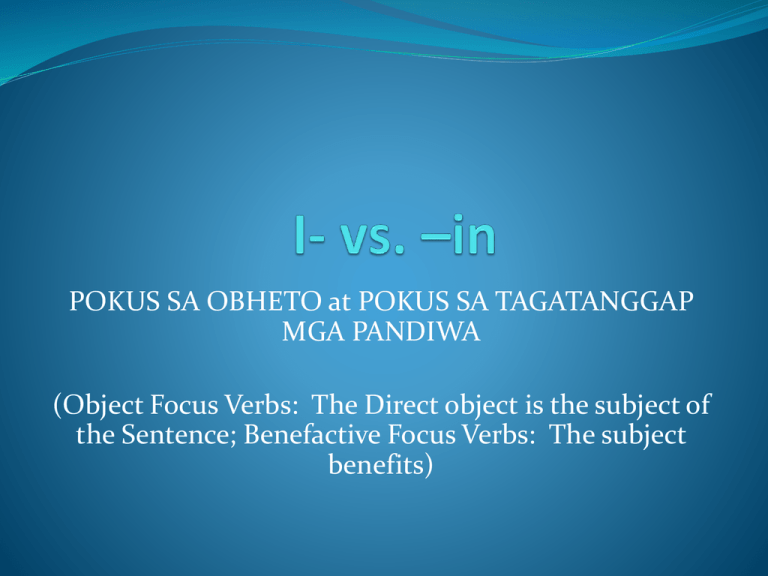
POKUS SA OBHETO at POKUS SA TAGATANGGAP MGA PANDIWA (Object Focus Verbs: The Direct object is the subject of the Sentence; Benefactive Focus Verbs: The subject benefits) Idinudugtong ang i- o -in- sa isang salitangugat para sabihin kung anong ginagawa ng aktor sa isang bagay i.e. ang paksa (add I- or –in to the root word to focus on the object of the sentence, i.e. the subject) May mga salitang-ugat na pandiwa na puwedeng dugtungan ng i- at –in at iisa pa rin ang ibig nitong sabihin. Halimbawa (Example): Pandiwa: tanong -> itanong -> tanungin Pangungusap: Itanong mo kay Tita kung paano mapapabuti ang iyong pagsusulat. Pangungusap: Tanungin mo kay Tita kung paano mapapabuti ang iyong pagsusulat. Sa ibang mga salitang-ugat kapag idinugtong ang i- o –in- hindi magkapareho ang ibig sabihin Halimbawa: Salitang-ugat: bili Ibili – to buy something for someone (Benefactive) Ibinili- bought something for someone Ibinibili- is buying something for someone Ibibili- will buy something for someone (Indicative-Benefactive ang mode o panagano ng pandiwa) Transitive Verbs v.t. Both I- and -In verbs can be Object Focus, that is the receiver of the action of the verb is the subject of the sentence. However, there are I- verbs that are Benefactive Focus which means the subject of the sentence or focus of the verb 'benefits' from the action. Examples of Benefactive Focus verbs are the following: ibili (to buy), ihanap (to find something), ihiram (to borrow), ikain (to eat for someone), ikuha (to get), isulat (to write), ihiwa (to slice something for someone) [in general: from -um-/mag- verbs same meaning] Bili (Indicative Object Focus) Salitang-ugat: bili Pawatas- bilhin (iregular)- to buy something Perpektibo: binili- bought something Imperpektibo: binibili- is buying something Kontemplatibo: bibilhin/ bibilin I- verb: OF vs BF Ibili/Iluto Ingles Bilhin/Lutuin Ingles Ibili mo ako. Buy me (something) Bilhin mo ako. Buy me Iluto mo ako. Cook me. Lutuin mo ako. Cook me. Common errors: -IN- verbs Salitang-ugat (RW) ✖ –in verbs ✔ I- verbs Balita - news balitain Ibalita- to relay or give news of Hulog- drop; fall hulugin Ihulog- to drop, deposit Tanim- plant tanimin Itanim- to plant Punas- wipe punasin Ipunas- to wipe Turo- point; teach turuin Ituro- to point/ to teach Tapon- throw tapunin Itapon- to throw Balik- return balikin Ibalik- to return Bukas/sara- open/close bukasin/sarhin Ibukas/ isara- to open/to close Gamitin ang mga pandiwa at gumawa ng pangungusap. (Word Order: VA [ang]N) Itangi +NG aktor (to make someone special) Imulat (to open the eyes/mind) Idalangin ... sa… (to pray for someone to God) Isigaw (to yell, shout) Iuntog (to bang the [head]) Salubungin (to meet someone) Gisingin (to wake up someone) Ubusin (to finish/consume something) Ayusin (to fix) I- Pokus sa Obheto vs. Tagatanggap (sa pangkalahatan [in general]) Obheto (galing sa mag- na pandiwa) ANG (the thing which is the subject) Tagatanggap (galing sa –um- na pandiwa) NG (the thing- D.O.) Iakyat (to bring upstairs) Ibili (to buy something for someone) Iayos (to fix) Ihanap ( to find something for…) Ibalik (to return) Ihiram (to borrow something f or … Ibalita (to bring news) Ikain (to eat for someone) Ibigay (to give) Ikuha (to get something for someone) Ibilad (to put something under the sun) Ibasa (galing sa –um- at mag- na pandiwa: to read) Idagdag (to add) Ilagay (to put) Iluto (to cook) Iprito (to fry) Isauli (to return) Isulat (to write) I Verbs that are both OF and BF Isulat mo ang pangalan mo. Isulat mo ako ng tula.


